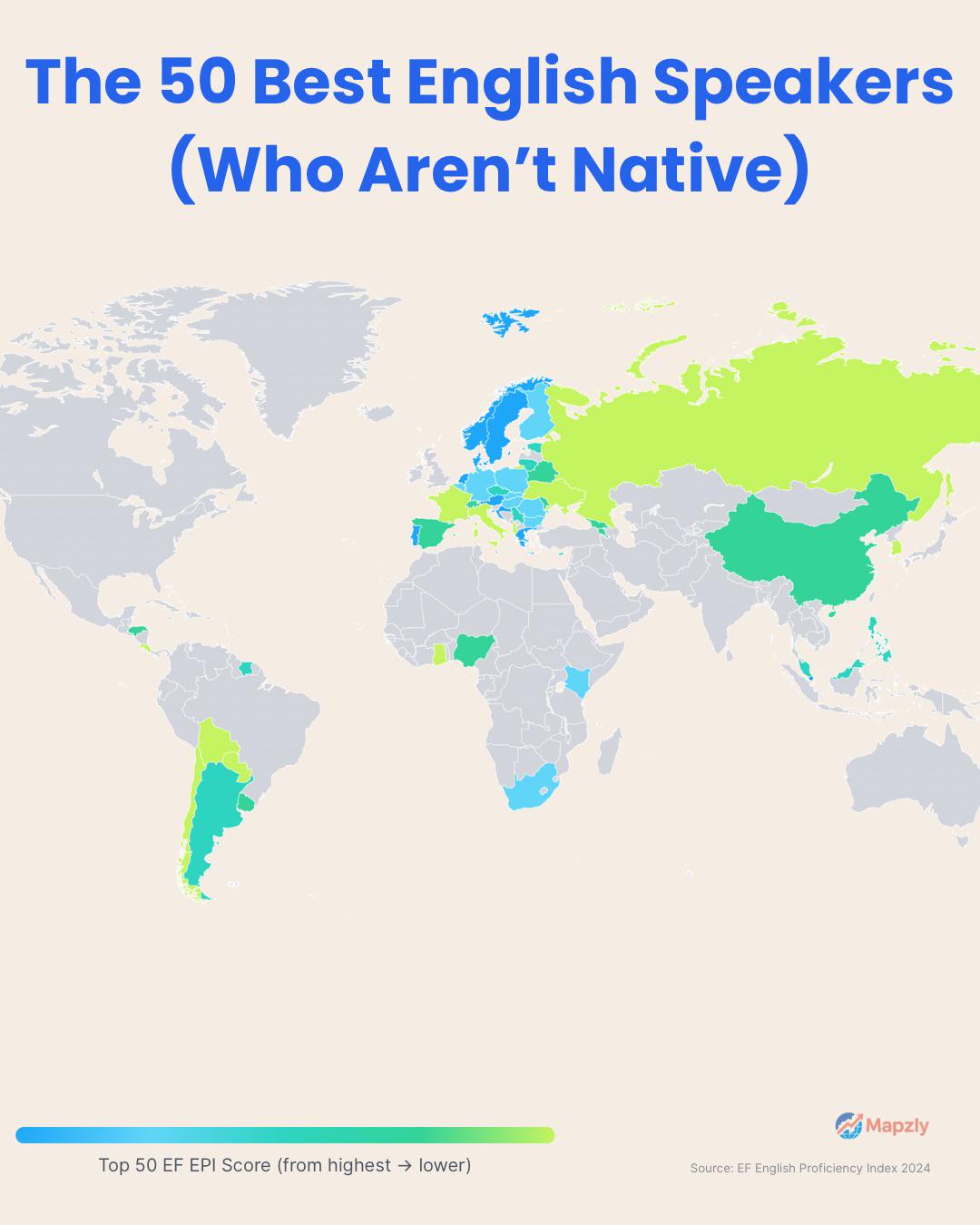Map of the 50 Best English Speakers


Alex Cartwright
Senior Cartographer & GIS Specialist
Alex Cartwright is a renowned cartographer and geographic information systems specialist with over 15 years of experience in spatial analysis and data...
Geographic Analysis
What This Map Shows
The "Map of the 50 Best English Speakers" visualizes the countries ranked by their English proficiency according to the EF English Proficiency Index 2024. This index evaluates the ability of non-native English speakers across various nations, providing insights into which countries excel in language skills. The map highlights a diverse range of nations, from Nordic countries to Southeast Asian nations, showcasing not just the proficiency levels but also the cultural and educational factors that contribute to these rankings.
Deep Dive into English Proficiency
Have you ever wondered why certain countries have higher English proficiency than others? The reasons are multifaceted and deeply rooted in education systems, cultural exposure, and even historical ties. The EF English Proficiency Index assesses English language skills using standardized testing, focusing on reading, writing, listening, and speaking abilities. As of 2024, countries like the Netherlands, Denmark, and Sweden consistently rank at the top, demonstrating high proficiency levels.
Interestingly, these nations often have educational systems that prioritize foreign language acquisition from a young age. In the Netherlands, for example, English is introduced in primary schools, and by the time students reach secondary education, they are expected to be quite fluent. This early intervention coupled with a strong emphasis on practical language use in social and professional contexts contributes significantly to their high proficiency scores.
Moreover, cultural factors play a crucial role. Countries with a heavy consumption of English-language media—be it movies, music, or books—tend to have populations that are more adept at English. For instance, many Scandinavian countries have a high level of exposure to English-language content, fostering an environment where learning the language feels natural and engaging.
On the other end of the spectrum, countries with lower proficiency levels often face challenges such as limited access to quality language education and a lack of immersion opportunities. For example, in some regions of the world, English is taught primarily as a written subject without sufficient emphasis on conversational skills, which can hinder overall fluency.
Regional Analysis
When examining English proficiency by region, significant variations emerge. In Europe, the Nordic countries dominate the rankings, with the Netherlands consistently holding the top spot. This region benefits from high-quality education systems, widespread English media consumption, and a cultural inclination towards multilingualism. Interestingly, countries like Portugal and Germany also score well, indicating a broader European trend where English is often viewed as a key to economic advancement and global connectivity.
In contrast, regions such as the Middle East and parts of Asia show a mixed picture. While countries like the Philippines and Malaysia boast relatively high proficiency levels, others, such as Afghanistan and Yemen, struggle due to political instability and limited educational resources. The Philippines, known for its strong connection to the English language through historical ties with the United States, benefits from a large population of English speakers, making it a unique case in the region.
Africa presents another contrasting scenario. While South Africa shows relatively high English proficiency, many other countries face obstacles, including a lack of formal educational structures for English language learning. Countries like Nigeria and Kenya, however, are making strides in incorporating English into their educational frameworks, recognizing its importance in global communication and commerce.
Significance and Impact
Understanding English proficiency on a global scale is crucial for several reasons. First, it highlights the interconnectedness of our world; as English becomes a lingua franca in business, science, and technology, countries with higher proficiency are better positioned to engage in international dialogue and commerce. This proficiency can lead to economic opportunities, making it a vital skill in today’s globalized economy.
Moreover, trends in English language acquisition can reflect broader educational and social patterns within countries. For example, as digital learning resources become more accessible, we may see shifts in proficiency levels in regions that were previously lagging. The pandemic has accelerated online learning, and it will be interesting to observe how this impacts English skills in the coming years.
In summary, the "Map of the 50 Best English Speakers" not only provides a snapshot of language proficiency but also serves as a lens through which we can view educational practices, cultural influences, and economic opportunities. As the world continues to change, the role of English language proficiency will likely evolve, making it a topic worth watching closely.
Visualization Details
- Published
- October 8, 2025
- Views
- 40
Comments
Loading comments...